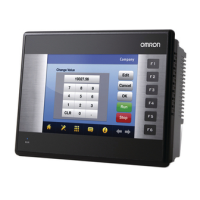OMRON APPENDIX C – Troubleshooting
Release 2.0 Page 301
• ‘…Elements’: Same as above except multiplied by number of array elements per point.
Ratio between Total Active Points and Total Active Points Elements shows how well
optimised (or badly like above) with use of arrays.
• Read Callbacks: Number of data postings from CX-Server.
• MSecs since last callback: Milliseconds waited since last data.
• Min, Max Average Callback interval: Calculation using above values.
• Write …: Same as above but for the writing part of output (and I/O) points.
• Data Changes: Number of inputs causing change of value.
Scripting errors
The scripting engines are very complex which provides many opportunities for errors. This can be
categorised as follows:
VBScript Syntax errors
These are seen during runtime as errors in the Error Log, often giving the line and character of the
error. Referring back to the original script should easily display the problem. Note that if the
@VBScript syntax is used within CX-Supervisor script the line number reported refers just to the
lines of VBScript, with the @VBScript being line 1.
To troubleshoot further:
• For specific help on VBScript language syntax see Microsoft’s web site at
http://msdn.microsoft.com/scripting
• Double check capitalisation, and objects names
• See Appendix B FAQ, “What are the syntax differences between VBScript and CX-Supervisor
script?”
• To confirm the line causing the problem, temporarily comment it out and see if the syntax error
is no longer reported
• As a test, try to simplify complex script lines into 1 or more lines with single instruction to
identify which instruction is causing the error
• As a test, simplify complex math formulae into several lines with single operation to identify
which operation is causing the error
• As a test, use hardcoded values for parameters using known valid values
• Display values using ‘MsgBox’ command or using the LogEvent command
• Confirm path of execution using ‘MsgBox’ in all conditional branches
